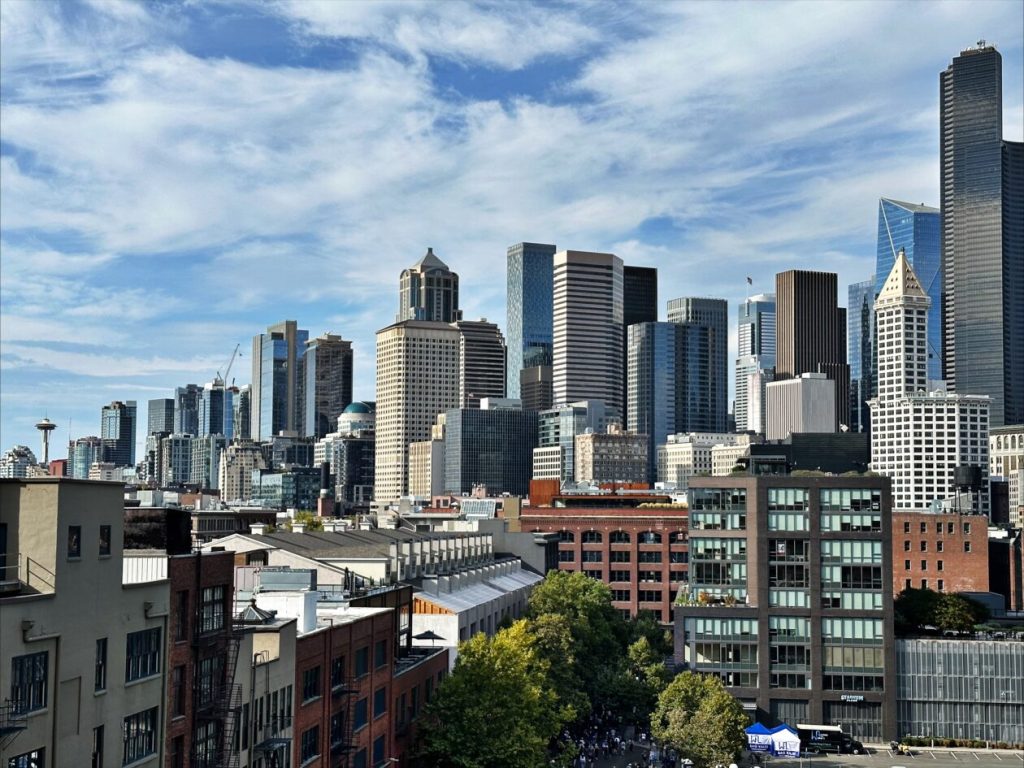Summarize this content to 2000 words in 6 paragraphs
The goal of the “U.S. Chamber of Connection” is to make transplants feel at home in their new city, including Seattle, where the organization is launching its pilot. (GeekWire Photo / Kurt Schlosser)
Moving to a new city has its challenges. Moving to Seattle is often viewed as especially difficult, whether it’s because of the weather or the so-called “Seattle Freeze” that allegedly leads to a chilly reception for newcomers.
A new civic organization called U.S. Chamber of Connection is using Seattle as its pilot city in a bid to help repair the social connections that it believes are lacking in modern society. The goal is to help everyone from tech workers to university students to refugees, retirees and anyone else looking for help finding their footing in a new place.
Aaron Hurst is the founder and CEO behind the effort. A longtime social entrepreneur, Hurst previously founded such organizations as the Taproot Foundation, Imperative, and Board.Dev, which were dedicated to building more connected communities.
Aaron Hurst, founder and CEO of U.S. Chamber of Connection. (Photo courtesy of Hurst)
Hurst and his wife moved to Seattle from Brooklyn, N.Y., 10 years ago, and he admitted that the big culture shift was a struggle. He heard from people that it would take at least five years to build relationships. He got pulled into the narrative of the freeze, which he believes can be a self-fulfilling prophecy, to some degree.
“At a certain point it was clear to me that we were going to stay in Seattle. And I was like, ‘I need to really build connection here,’” Hurst said. He started hosting dinners twice a month for six to eight people, having conversations about various experiences in Seattle. “That really helped me understand the nature of this challenge.”
Hurst said that even though Seattle attracts a broad range of newcomers, tech certainly represents the dominant population, and it’s where a lot of the friction happens between “locals” and transplants. He called it an unhealthy dynamic for the civic environment.
“We’re seeing volunteering going down, philanthropy going down, there has not been a good job of integrating tech talent into the city itself,” Hurst said. “There’s a really big impact on both those individuals and on the city and its ability to thrive. So a big part of this is trying to bridge those two worlds.”
Seattle is not alone in its need for more social connection, Hurst said, citing a loneliness epidemic across America that can be linked to changes in habits brought on by the internet, social media, political division, the pandemic and remote work.
To combat this, the Chamber of Connection has attracted a number of “welcome committee” members across a variety of Seattle companies and institutions, including Microsoft, Amazon, the University of Washington, Seattle University, the Seattle Mariners, Kraken and more.
“The goal is to have a committee that represents all the different newcomer populations,” Hurst said. “Part of the challenge is people in the arts need to meet people in tech who need to meet people in medicine. This is where innovation and magic happens, and where friendships that are going to change the city and country are going to happen.”
The U.S. Surgeon General reports that 44 million American adults are experiencing significant loneliness and 26 million report having no friends. (GeekWire Photo / Kurt Schlosser)
Jen Haller, partner and chief of staff at Seattle venture capital firm Ascend, joined the welcome committee because she feels the Chamber is addressing a critical need for human connection.
“Moving to a new city can feel overwhelming, particularly for folks working in tech,” Haller said. “I’m excited about the Chamber’s potential to help people connect, build relationships, and find their place in our vibrant and growing tech community.”
Starting in February, the Chamber of Connection, in partnership with Town Hall, will host what is basically a monthly orientation event for new Seattle residents, where a four-hour session on a Saturday can help introduce people to the city.
The organization also created “6 Points of Connection” as an actionable checklist for individuals and leaders to define and strengthen social bonds. The list includes such things as establishing weekly social interactions outside of work and the home, and engaging in volunteer activities.
In addition, the group wants to recruit leaders to establish a dedicated “clubhouse” in every Seattle neighborhood where newcomers can meet their neighbors and make new friends. An online community will also provide a safe space to help facilitate get togethers.
The Chamber of Connection hopes to be in 50 U.S. cities in 10 years. The nonprofit will look to generate income via members and events so it’s not dependent on philanthropy. Co-founder Linsey Morrison is the group’s chief operating officer, Shasta Nelson is chief friendship officer, and Michael Hebb is a founding board member.
Hurst has been in touch with Mayor Bruce Harrell’s office and said they’re enthusiastic about how the idea fits with the mayor’s “One Seattle” vision.
“One of the biggest ways in which we’re not ‘One Seattle’ today is this frame of real Seattleites and non-real Seattleites,” Hurst said. “People want something positive and local to focus on. People are tired of fighting and they want to be able to start to actually build something that they can control and that actually brings joy to their lives.”
Related:















